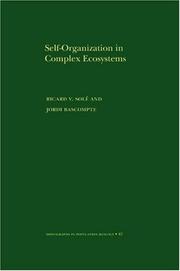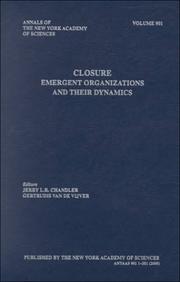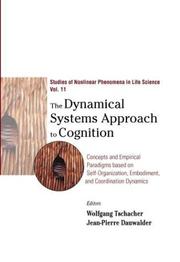| Listing 1 - 10 of 123 | << page >> |
Sort by
|
Book
ISBN: 162618917X 9781626189171 1626188653 9781626188655 Year: 2013 Publisher: New York
Abstract | Keywords | Export | Availability | Bookmark
 Loading...
Loading...Choose an application
- Reference Manager
- EndNote
- RefWorks (Direct export to RefWorks)
Self-organization is a universal mechanism in nature. In the past thirty years, numerous phenomena, theories and methods on self-organization have been founded around the world. This book presents recent achievements in theories and methods of self-organization and includes such theories and methods of self-organization as ant algorithms, particle swarm algorithms, artificial neural networks, motion and migration algorithms, self-adaptive Kalman Filters, finite state approximations, etc. Chapters are contributed by more than 20 scientists from China, Italy, Spain, Japan, Russia, Serbia, India,
Self-organizing systems. --- Learning systems (Automatic control) --- Self-optimizing systems --- Cybernetics --- Intellect --- Learning ability --- Synergetics
Book
ISBN: 178985878X 1789858771 Year: 2021 Publisher: London, England : IntechOpen,
Abstract | Keywords | Export | Availability | Bookmark
 Loading...
Loading...Choose an application
- Reference Manager
- EndNote
- RefWorks (Direct export to RefWorks)
Self-organizing systems. --- Learning systems (Automatic control) --- Self-optimizing systems --- Cybernetics --- Intellect --- Learning ability --- Synergetics

ISBN: 1283380048 9786613380043 140084293X 9781400842933 9780691070391 0691070393 9780691070407 0691070407 Year: 2012 Publisher: Princeton, NJ
Abstract | Keywords | Export | Availability | Bookmark
 Loading...
Loading...Choose an application
- Reference Manager
- EndNote
- RefWorks (Direct export to RefWorks)
Can physics be an appropriate framework for the understanding of ecological science? Most ecologists would probably agree that there is little relation between the complexity of natural ecosystems and the simplicity of any example derived from Newtonian physics. Though ecologists have long been interested in concepts originally developed by statistical physicists and later applied to explain everything from why stock markets crash to why rivers develop particular branching patterns, applying such concepts to ecosystems has remained a challenge. Self-Organization in Complex Ecosystems is the first book to clearly synthesize what we have learned about the usefulness of tools from statistical physics in ecology. Ricard Solé and Jordi Bascompte provide a comprehensive introduction to complex systems theory, and ask: do universal laws shape the structure of ecosystems, at least at some scales? They offer the most compelling array of theoretical evidence to date of the potential of nonlinear ecological interactions to generate nonrandom, self-organized patterns at all levels. Tackling classic ecological questions--from population dynamics to biodiversity to macroevolution--the book's novel presentation of theories and data shows the power of statistical physics and complexity in ecology. Self-Organization in Complex Ecosystems will be a staple resource for years to come for ecologists interested in complex systems theory as well as mathematicians and physicists interested in ecology.
Self-organizing systems. --- Ecology --- Learning systems (Automatic control) --- Self-optimizing systems --- Cybernetics --- Intellect --- Learning ability --- Synergetics --- Mathematical models. --- Population biology.
Book
ISBN: 0387123563 9780387123561 Year: 1983 Volume: 1 Publisher: Berlin Springer
Abstract | Keywords | Export | Availability | Bookmark
 Loading...
Loading...Choose an application
- Reference Manager
- EndNote
- RefWorks (Direct export to RefWorks)
Chemical thermodynamics --- fysicochemie --- System theory --- Self-organizing systems --- Systems, Theory of --- Systems science --- Science --- Learning systems (Automatic control) --- Self-optimizing systems --- Cybernetics --- Intellect --- Learning ability --- Synergetics --- Philosophy

ISBN: 1573312487 1573312495 Year: 2000 Volume: 901 Publisher: New York, NY : New York Academy of Sciences,
Abstract | Keywords | Export | Availability | Bookmark
 Loading...
Loading...Choose an application
- Reference Manager
- EndNote
- RefWorks (Direct export to RefWorks)
Natural selection --- Evolution (Biology) --- Self-organizing systems --- Philosophy. --- Learning systems (Automatic control) --- Self-optimizing systems --- Cybernetics --- Intellect --- Learning ability --- Synergetics --- Philosophy --- Self-organizing systems - Philosophy.

ISBN: 2863160222 9782863160220 Year: 1987 Publisher: Paris L'originel
Abstract | Keywords | Export | Availability | Bookmark
 Loading...
Loading...Choose an application
- Reference Manager
- EndNote
- RefWorks (Direct export to RefWorks)
Self-organizing systems --- Scientists --- Interviews --- -Professions --- Learning systems (Automatic control) --- Self-optimizing systems --- Cybernetics --- Intellect --- Learning ability --- Synergetics --- -Interviews --- -Learning systems (Automatic control) --- Scientists - Interviews
Book
ISBN: 1728172772 1728172780 Year: 2020 Publisher: Los Alamitos, California : IEEE Computer Society, Conference Publishing Services,
Abstract | Keywords | Export | Availability | Bookmark
 Loading...
Loading...Choose an application
- Reference Manager
- EndNote
- RefWorks (Direct export to RefWorks)
Autonomic computing --- Self-organizing systems --- Learning systems (Automatic control) --- Self-optimizing systems --- Cybernetics --- Intellect --- Learning ability --- Synergetics --- Electronic data processing --- Data processing
Book
ISBN: 1728184142 1728184150 Year: 2020 Publisher: Los Alamitos, California : IEEE Computer Society, Conference Publishing Services,
Abstract | Keywords | Export | Availability | Bookmark
 Loading...
Loading...Choose an application
- Reference Manager
- EndNote
- RefWorks (Direct export to RefWorks)
Autonomic computing --- Self-organizing systems --- Learning systems (Automatic control) --- Self-optimizing systems --- Cybernetics --- Intellect --- Learning ability --- Synergetics --- Electronic data processing --- Data processing

ISBN: 1281876798 9786611876791 981256439X 9812386106 9789812386106 9789812564399 Year: 2003 Publisher: River Edge, N.J. : World Scientific,
Abstract | Keywords | Export | Availability | Bookmark
 Loading...
Loading...Choose an application
- Reference Manager
- EndNote
- RefWorks (Direct export to RefWorks)
The shared platform of the articles collected in this volume is usedto advocate a dynamical systems approach to cognition. It is arguedthat recent developments in cognitive science towards an account ofembodiment, together with the general approach of complexity theoryand dynamics, have a major impact on behavioral and cognitivescience.
Cognition. --- Cognitive psychology. --- Self-organizing systems. --- Learning systems (Automatic control) --- Self-optimizing systems --- Cybernetics --- Intellect --- Learning ability --- Synergetics --- Psychology, Cognitive --- Cognitive science --- Psychology
Book
ISBN: 9781614708384 161470838X 9781614708094 1614708096 Year: 2012 Publisher: New York
Abstract | Keywords | Export | Availability | Bookmark
 Loading...
Loading...Choose an application
- Reference Manager
- EndNote
- RefWorks (Direct export to RefWorks)
Self-organizing systems --- Information theory --- Communication theory --- Communication --- Cybernetics --- Learning systems (Automatic control) --- Self-optimizing systems --- Intellect --- Learning ability --- Synergetics --- E-books --- Information theory. --- Self-organizing systems.
| Listing 1 - 10 of 123 | << page >> |
Sort by
|

 Search
Search Feedback
Feedback About UniCat
About UniCat  Help
Help News
News